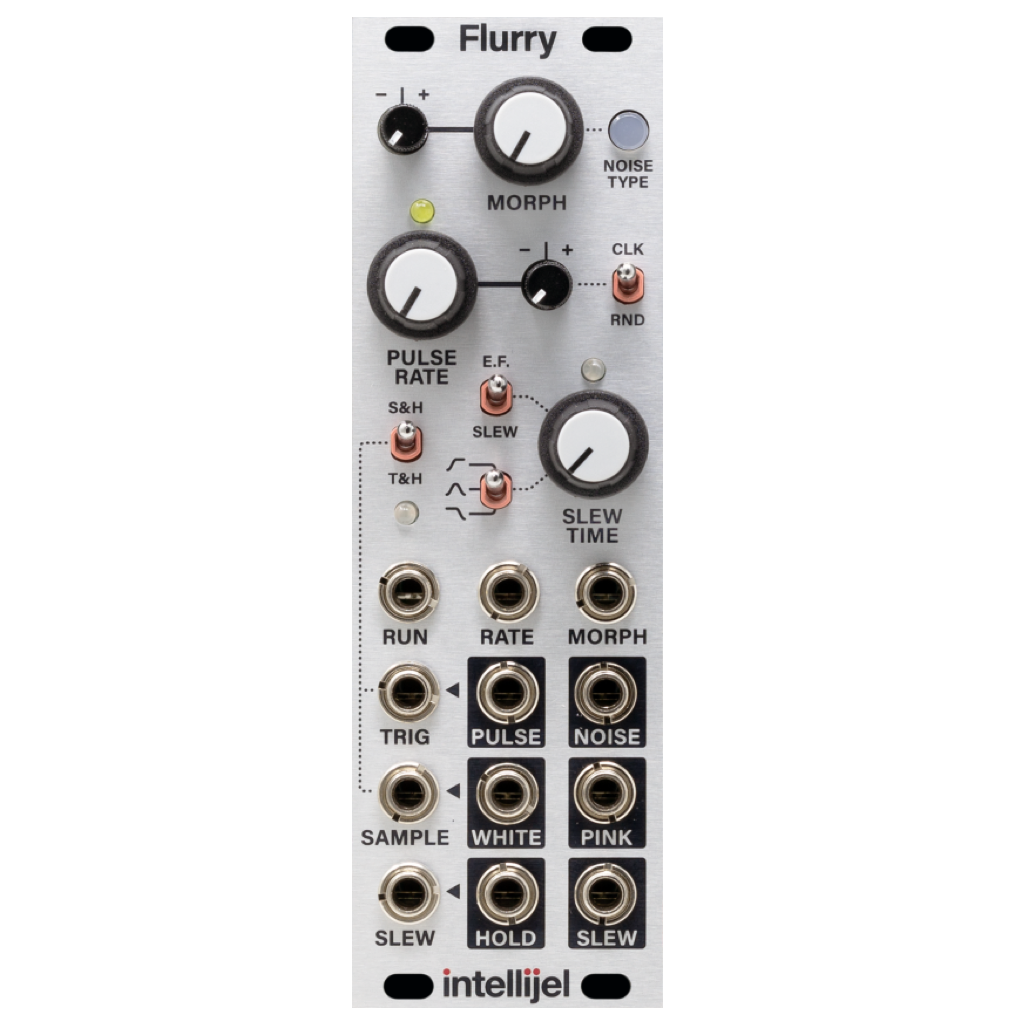Indeed, unwanted noise is undesirable. But not all noise is unwanted. Synthesizing the sound of wind or waves are a couple of the more obvious uses for a noise generator, but the possibilities go far beyond. The crack of a snare hit; the breathiness of a flute sound; an added sizzle to a resonant pad — all are within the sonic domain of noise.
Functions
- 16 digital noise types, each with 2 morph parameters, one with a modulation input.
- A clock and random pulse source with adjustable and modulatable rate.
- Accurate pink and white noise sources.
- Analog sample & hold and track & hold circuits with very low droop.
- Analog slew with adjustable slew time and edge selection (rising edge, falling edge, or both).
- Analog envelope follower.
One of Flurry’s more interesting aspects is its collection of digital noise generators, which provide a wealth of interesting noises, suitable for either audio or modulation purposes. Each noise type has its own pair of unique parameters to further dial in the desired characteristics, with the primary parameter under CV control.
But noise has many other benefits beyond simply being heard. Noise happens to make a wonderful modulator. When noise is used to modulate a filter’s cutoff frequency, or an oscillator’s pitch or pulse width, then all sorts of raspy, buzzy, gritty timbres are obtained.
Noise is also a key ingredient in sample & hold circuits — a technique most commonly used to generate stepped, random voltages. The circuit works by sampling an input signal’s voltage each time you send it a clock pulse, and holding that voltage until the next clock pulse. So, naturally, Flurry also contains the requisite clocking tools! Two of the most common destinations for the S&H output are a filter’s cutoff frequency (creating stepped, clocked timbral changes), and oscillator pitch (which produces random notes at clocked intervals).
Of course, you might not always want your voltages to change so abruptly at each clock pulse. Maybe you’d prefer they wobble about gradually and with more grace? To do that, you need a slew circuit, and once again Flurry has you covered — allowing you to select not just the slew time, but also whether the slew is applied to rising voltages, falling voltages, or both. A flick of the switch, and that Slew circuit becomes an envelope follower, enabling Flurry to generate envelopes from input signals (syncing to drum hits are a common use).
With all these features, plus the ability to create random pulses, clock to external pulses, and perform more esoteric track & hold duties, Flurry is a noise lover’s toolbox.
16 Noise Types
BANK 01
| COLOR | NOISE TYPE | DESCRIPTION | MORPH | ALT + MORPH |
|---|---|---|---|---|
| FLASHES | Rainbow | All Noise Types accessible via the MORPH knob | Cycles through all the Noise Types across both banks | Adjusts each Noise Type’s primary MORPH parameter |
| RED | Vinyl | Pops, clicks and hiss | Density | Hiss |
| ORANGE | Wind | Synthetic wind FX | Fundamental | Activity rate |
| YELLOW | Droplets | Random FM’d wavelets | Rate | Resonance |
| GREEN | FM Regen | 4 Op FM patch generator | Regen Rate | Max base freq |
| CYAN | FM Drum | Bank of FM drums | Drum Sound1 | Bitcrush amount |
| BLUE | Cymbal | Cymbal Noise | Tuning: ±2 oct | HPF |
| PURPLE | Barber Pole | Phased white noise | Rate | Q & direction |
| MAGENTA | Shortwave | Shortwave emulation | Carrier frequency | Squelch depth |
BANK 02
| COLOR | NOISE TYPE | DESCRIPTION | MORPH | ALT + MORPH |
|---|---|---|---|---|
| FLASHES | Rainbow | All Noise Types accessible via the MORPH knob | Cycles through all Noise Types across both banks | Adjusts each Noise Type’s primary MORPH parameter |
| RED | Amp Hum/Hiss | Amp hum with hiss | Hum level | Cycles2 |
| ORANGE | Looped White | Tunable white noise loop | Tuning | Buffer length3 |
| YELLOW | Particle | Particle generator | Density | Spread |
| GREEN | FM Noise | 3 Op FM noise | Fundamental | FM Index |
| CYAN | Phreakbox | Phone tone generator | Tone4 | Phone distortion |
| BLUE | Cymbal 2 | Alternate cymbal noise | Pulse Width5 | Fundamental |
| PURPLE | Noise Chorus | Chorused white noise | Rate | Depth |
| MAGENTA | Chaos | Chaotic noise generator | Chaos A | Chaos B |
Select your Bank by holding the NOISE TYPE button and turning the Morph Attenuverter to the – side for Bank 1 and the + side for Bank 2.
1 Selects from Kick, Snare, Hat, Cowbell and Cymbal as you rotate the knob.
2 Clockwise from noon = 60 cycle hum + peak filter freq | CCW from noon = 50 cycle hum + peak filter freq.
3 Buffer Length increases from 256-4096 as you turn the knob. Regenerates when fully clockwise.
4 From CCW>CW: Dial Tone > 1…9 > 0 > # > * > Busy Tone > Ring Tone > A > B > C > D > FSK_0 > FSK_1
5 Pulse Width ranges from 3% to 50%

